More than 130 arrested at pro-Palestinian protest at UMass
|
Published: 05-08-2024 10:18 AM
Modified: 05-09-2024 12:05 PM |
AMHERST — More than 130 people were arrested on the University of Massachusetts campus Tuesday night after those who set up a pro-Palestinian encampment on the South Lawn of the Student Union refused to dismantle tents and other parts of the site and didn’t comply with dispersal orders from police, according to UMass spokesman Ed Blaguszewski.
As of 9 a.m. Wednesday, UMass Police reported that 109 people had been booked on various charges and that criminal charges were pending for another 25 or so individuals.
The number of arrests is more than double the 57 protesters who were taken into custody at Whitmore Administration Building last fall after refusing to leave the building when it closed.
The arrests came after a message from Chancellor Javier Reyes that there were many paths to resolve the encampment without arrests. Those paths had included discussions between Reyes and representatives of the protest and a message delivered by the UMass Demonstration Response and Safety Team.
Stephen Karam, chairman of the UMass board of trustees, issued a statement offering his board’s “full and unwavering support for Chancellor Javier Reyes.”
“We have absolute confidence in his leadership, his integrity and his commitment to our students,” Karam said.
An earlier message from Reyes stated: “Demonstrators rejected our offers for continued civil discourse to help bridge our differences and refused to dismantle their encampment. While we have told demonstrators that failure to remove the tents and barriers may result in arrests, this is not the outcome we had hoped for.
“Let me be clear — involving law enforcement is the absolute last resort.”
Article continues after...
Yesterday's Most Read Articles
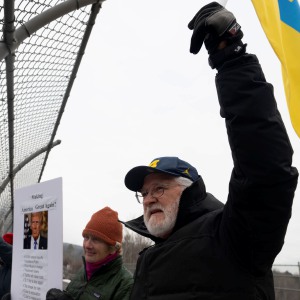 Local ‘Hands Off!’ standouts planned as part of national effort
Local ‘Hands Off!’ standouts planned as part of national effort
 Long-vacant former Faces spot in Northampton gets new tenant
Long-vacant former Faces spot in Northampton gets new tenant
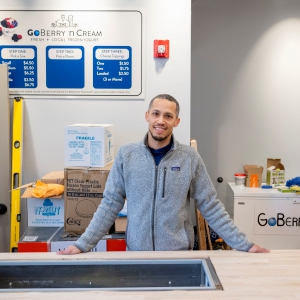 Here come the sweetness: Four new businesses prepping to open in downtown Northampton
Here come the sweetness: Four new businesses prepping to open in downtown Northampton
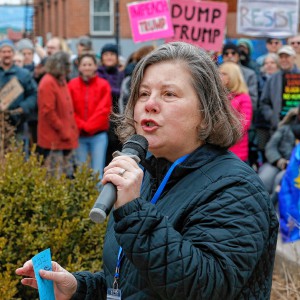 State senators organize Trump defense: Comerford a leader on Response 2025 initiative
State senators organize Trump defense: Comerford a leader on Response 2025 initiative
 Five UMass Amherst students have visas, student status revoked
Five UMass Amherst students have visas, student status revoked
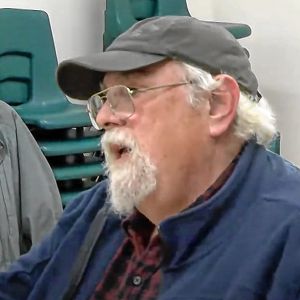 Hatfield Select Board removes elected Housing Authority member
Hatfield Select Board removes elected Housing Authority member
During his conversation with representatives of the protest a series of demands were discussed, ranging from financial divestment from companies involved in supplying munitions to Israel to the status of students’ civil court cases following the October 2023 Whitmore arrests. Reyes informed them that all infractions had been reduced to civil penalties and clarification would be sought on the status of those civil proceedings.
One of those arrested was Nate Foster, a UMass senior, who said he was among the last 45 arrested a bit after midnight and was then transported by PVTA bus to the Mullins Center. There, he and the others were placed in the middle of the rink and had their hands tied behind their backs with flex cuffs. Foster said the State Police officer who arrested him told him and others they were being arrested on charges of trespassing, resisting arrest and refusal to disperse.
“This was one of the most ridiculous experiences I’ve ever had in my life,” Foster said.
Foster argues that the situation was entirely avoidable and contends that Reyes intentionally wanted state troopers to use a show of force. Five minutes after the discussion with student representatives, in which Reyes refused to meet the divestment demands, police moved in, he said.
“The area was fully militarized for the purpose of brutalizing our students,” Foster said. “Our campus was made unsafe by our chancellor.”
Once at the arena, those arrested were squished together, not provided water and had limited access to bathrooms, Foster said, and couldn’t stand up or lie down. They were brought to the UMass Police Department early Wednesday morning to be processed and bailed out and had arraignment dates set in Eastern Hampshire District Court in Belchertown.
Another of those arrested was Hampshire College student Henry Morgan, who was at the encampment to write an independent news article and was wearing a homemade press badge.
“Trying to cover the way police respond to a peaceful protest, I got way more experience of being repressed,” Morgan said, noting that the State Police officer who arrested him said the charge was disorderly conduct. Like Foster, he was then brought to the Mullins Center via a PVTA bus and held in flex cuffs alongside others.
Even though it was not a pleasant experience, Morgan said he made the most of it by singing songs with others who spent the night in the arena.
“I enjoyed being together and the camaraderie, even while being repressed,” Morgan said.
Morgan also noted his appreciation for state Rep. Lindsay Sabadosa, whom he spoke to recently about the campus protests. He said she has advocated that there be no force used by police, including pepper spray.
Sanjiv Gupta, an associate professor of sociology at UMass who attended the protest, said the atmosphere before 7:30 p.m. was “festive” in nature.
“It was totally peaceful to the point that three administrators were able to walk through, unaccompanied by police,” Gupta said, also noting that a counterprotester with an Israeli flag had also been able to walk up to students and have a conversation with them.
“And then around 7:30, when the police showed up, the mood changed. ... People were more energized, I would say, and it felt like they were being provoked.”
UMass Faculty for Justice in Palestine issued a statement Wednesday afternoon criticizing how Reyes handled the situation.
“Chancellor Reyes’ response was repressive and caused harm to our students and the campus community he is supposed to be serving,” said Hoang Phan, an associate professor of English who has worked at the university since 2006. “Calling UMPD and state police against our students was his first response, and it was a failure of leadership.”
In fact, UMass faculty members were among the first to be arrested, including Marianna Ritchey, an associate professor of music and dance.
“We screamed and begged for the cops not to touch our students, but we were ignored,” Ritchey said. “No one’s scholarship, teaching or learning are safe so long as administrators can call in the militarized armies of the state to police our speech with impunity. This overreach should concern everyone involved in the actual labor of running this university.”
Blaguszewski didn’t immediately respond to questions about how police were deployed, the concerns over the militarization of the campus and the conditions at the Mullins Center as it was used as a holding cell or the sanctions that students and faculty might face.
Videos of those being arrested, which included some faculty and community members, were posted to the Students for Justice in Palestine Instagram page, where the group promoted a Rally for Rafah on Wednesday afternoon at the Student Union and also created an online sheet to sign stating they have no confidence in Reyes’ leadership.
At that rally, hundreds of students and faculty gathered in front of the UMass Student Center, braving thunderstorm conditions to protest the actions taken by campus administration regarding the arrests and against the incursion into Rafah by Israeli troops.
Kevin Young, an associate professor of history at UMass who was among those arrested, spoke at the rally.
“I’ve been here nine years, and I’ve never been so ashamed of my university’s administration,” he said. “And yet, I’ve never been so proud and so energized as I am in this movement.”
Young also said he had been at the meeting between the students and administration before the arrests and praised the students’ conduct in contrast to the administration.
“I saw student negotiators who were informed, they were reasonable, they were ready to negotiate in good faith,” he told the crowd. “What I saw on the other side of the table was an administration that was completely unwilling to budge, unwilling to use real power that it has to make progress towards those demands.”
Hadiya Ahmad, the secretary of public relations for the school’s undergraduate Student Government Association, told those gathered that the SGA had started a motion of no confidence in Reyes as chancellor of the school. She said the SGA would not vote on the motion immediately but rather hoped to allow for more open conversation with the administration before moving the motion to a vote.
“This is our biggest card as the Student Government Association, our last play,” Ahmad said. “This is our last chance to tell Chancellor Reyes to stop what he’s doing, to stop ignoring the advocacy of students, to implement divestment and to stop mobilizing police.”
The five largest unions on campus — AFSCME Local 1776, the Graduate Employee Organization, the Massachusetts Society of Professors, the Professional Staff Union and the University Staff Association — also issued a statement Wednesday afternoon.
“It did not have to go like this. We are appalled by police crackdowns in response to campus protests — at Columbia, the University of California Los Angeles, the University of Texas Austin, the University of Wisconsin Madison. In this national atmosphere, Reyes’ decision to ask the police to break up the protest was tantamount to inviting police violence.
“By contrast, UMass could have sided with campuses that chose peaceful resolutions. University administrations at Wesleyan, Northwestern, Brown, Rutgers, the University of Minnesota and the University of California, Riverside, among others, have negotiated with students and avoided violence.”
Carol Rose, executive director of the ACLU of Massachusetts, issued a statement expressing concern for the arrests and use of armed police officers on the UMass campus.
“While other campuses across the country have engaged demonstrators in productive dialogue, we are highly concerned that University of Massachusetts Amherst leaders chose to invite armed police into a campus protest environment,” Rose said. “Reports that police may have attempted to shield their activity from press and legal observers raise additional concerns about press freedom and transparency, which are essential to accountability,” Rose’s statement read.
“Last night in Amherst, and events on campuses across the country, make clear: When universities choose to involve police in nonviolent demonstrations, it escalates tensions and creates unacceptable safety risks for all students, faculty and community members. Campus administrators have an obligation to protect students’ safety on campus; at the same time, they must take all necessary measures to protect students’ right to protest. Calling heavily armed police on student political expression is an inherently dangerous choice.
“With protests ongoing, including at Harvard and MIT, the ACLU continues to urge campus officials and police to show restraint and engage in dialogue and other nonviolent approaches — not force.”
Scott Merzbach can be reached at smerzbach@gazettenet.com. Alexander MacDougall can be reached at amacdougall@gazettenet.com.


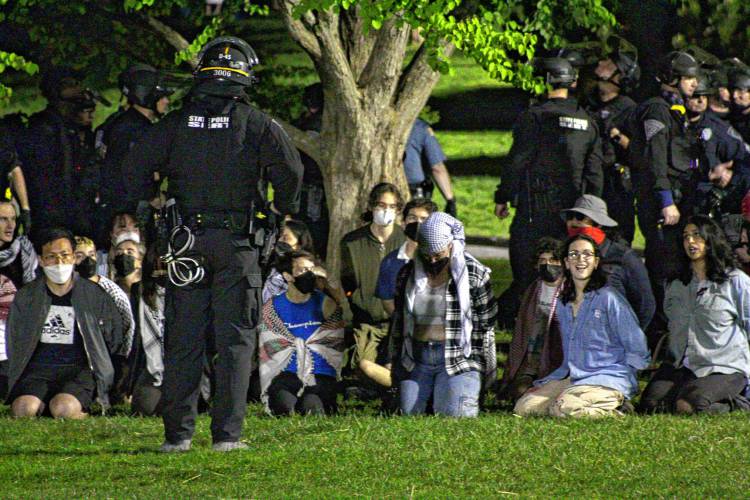




















 ‘Delightful’ Northampton store shopping guide Jane Hertz, 88, seeking next gig
‘Delightful’ Northampton store shopping guide Jane Hertz, 88, seeking next gig Photo: Spring calling
Photo: Spring calling A father’s dream to be the best: Twelve men graduate from Nurturing Fathers program
A father’s dream to be the best: Twelve men graduate from Nurturing Fathers program
